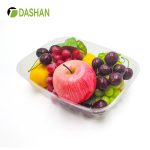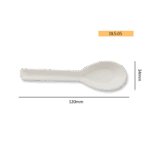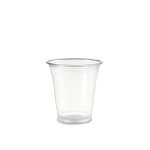Quick Summary
Corn-starch coffee cups are redefining the way we enjoy our daily brew. Unlike plastic-lined paper cups, they are biodegradable, compostable, and PFAS-free. DASHAN’s eco-friendly cornstarch cups offer cafés, offices, and takeout services a sustainable solution that keeps beverages hot while protecting the planet.
Introduction: Coffee and the Cup Problem
For millions of people around the world, coffee is more than just a drink—it’s a daily ritual, a morning lifeline, or an excuse to catch up with friends. Yet with every cappuccino or latte served to go, there’s often a hidden environmental cost: the disposable cup. Traditional paper cups are lined with plastic, making them difficult to recycle, and millions end up in landfills or oceans each year.
Enter the corn starch cup—a cup that looks like the ones you already use, but with a future that’s far kinder to the planet. Unlike traditional cups that linger for centuries, corn starch cups can compost and return to nature. In short: your coffee can now be served in a cup that disappears.
1. Why Traditional Paper Cups Aren’t So Innocent
Most paper cups are not fully paper. They have a thin layer of polyethylene plastic lining that prevents leaks. While that lining is great for your latte, it’s terrible for recycling. Even when tossed in the right bin, many recycling plants can’t process them efficiently.
A report by the World Economic Forum suggests that over 250 billion disposable cups are used globally each year. Most of these end up as waste, despite the widespread presence of recycling logos. The problem isn’t just volume—it’s contamination and mixed materials.
This is where innovation in materials becomes critical. Consumers demand their takeaway coffee, but they also want guilt-free packaging.
2. The Science Behind Corn Starch Cups
Corn starch cups are made from polylactic acid (PLA), a bioplastic derived from renewable corn starch. PLA is compostable in industrial facilities, breaking down into water and carbon dioxide rather than microplastics.
Key features include:
- Heat resistance: Holds hot beverages up to 90°C without softening.
- Durability: Comparable strength to conventional paper cups.
- Compostability: Breaks down in 3–6 months under industrial composting.
- Safety: Certified food-grade, BPA-free, and PFAS-free.
DASHAN’s line of corn starch cups is designed specifically for coffee shops, offices, and events. They’re available in standard coffee cup sizes (8oz, 12oz, 16oz), with optional lids made from either cornstarch-based materials or recyclable PP.
3. Global Coffee Culture Meets Sustainability
From Barcelona to New York, Tokyo to Berlin, coffee consumption has exploded in the past decade. With it, the environmental burden of cups has too.
- Starbucks has launched trials for reusable cup return systems in Europe.
- Costa Coffee in the UK offers discounts for customers bringing reusable cups.
- Independent cafés worldwide increasingly adopt biodegradable packaging to appeal to eco-conscious millennials and Gen Z.
Consumers are no longer just judging their latte art; they’re asking questions like: “Is this cup compostable?” and “Does this lid contain PFAS?” The rise of sustainable tableware is now part of brand identity.
4. Policies Driving Change
Government regulations are accelerating this shift.
- European Union: The Single-Use Plastics Directive bans certain disposable plastics, including food and drink containers made of expanded polystyrene. Many EU member states now encourage biodegradable or compostable options.
- United States: States like California, New York, and Vermont have restrictions on PFAS in food packaging, pushing suppliers toward safer alternatives.
- Asia: Countries like Japan and South Korea are promoting compostable packaging as part of their waste reduction targets.
For coffee retailers, this means switching to alternatives like corn starch cups isn’t just ethical—it’s becoming legally necessary.
5. Why Corn Starch Cups Are Different from Paper Cups
Let’s face it: paper cups had their chance, but the hidden plastic lining is a deal-breaker. Here’s a clear comparison:
| Feature | Paper Cups | Corn Starch Cups (DASHAN) |
|---|---|---|
| Material | Paper + plastic lining | PLA from renewable corn starch |
| Recyclability | Difficult (plastic-paper combo) | Compostable in facilities |
| Heat Resistance | Moderate | High (up to 90°C) |
| PFAS-free | Often not | Yes |
| Biodegradability | No | Yes |
For the consumer, the difference is invisible in use—but visible in impact.
6. The DASHAN Advantage
DASHAN is more than a manufacturer—it’s a partner in sustainability. Our corn starch cups are:
- Customizable with branding and designs.
- Globally compliant, meeting EU, US, and Asian standards for compostable products.
- Safe and certified, ensuring no hidden chemicals like BPA or PFAS.
- Versatile, ideal for coffee shops, offices, events, and takeaway chains.
We also provide bagasse trays and containers, allowing businesses to adopt a full eco-packaging solution—not just cups. By combining corn starch and bagasse, DASHAN helps clients transition smoothly into a plastic-free future.
7. Consumer Perspective: Why It Matters
Imagine sipping your morning coffee and knowing the cup won’t end up in a landfill for 500 years. That’s the emotional connection consumers are seeking today.
Surveys show that 68% of global consumers are willing to pay more for eco-friendly packaging. Among younger coffee drinkers, sustainability is almost as important as flavor. For cafés, offering biodegradable cups isn’t just good PR—it’s good business.
8. Challenges and the Road Ahead
Of course, it’s not all smooth brewing. Corn starch cups require industrial composting, which isn’t available everywhere. Education and proper labeling are key to preventing them from ending up in the wrong bin.
But as composting infrastructure expands—and with consumer demand rising—the future looks bright. Countries are investing in circular economy strategies, and businesses like DASHAN are leading the product side of the solution.
Conclusion: A Cup That Disappears
Your coffee cup no longer has to outlive you. With corn starch cups, sustainability and convenience finally meet. By switching to biodegradable, compostable solutions like DASHAN’s cups, coffee shops, offices, and consumers can enjoy their daily ritual without harming the planet.
The next time you order a latte, imagine this: the cup in your hand will one day return to the soil instead of piling up in a landfill. That’s progress worth sipping to.
FAQ – Your Coffee Can Now Be Served in a Cup That Disappears
Q1: What are corn starch cups made of?
Corn starch cups are made from renewable plant-based starches, primarily derived from corn. They are designed to be biodegradable and compostable under industrial or home composting conditions.
Q2: Are corn starch cups safe for hot beverages?
Yes. Corn starch cups are heat-resistant, sturdy, and safe for serving hot drinks like coffee or tea. They don’t release harmful chemicals, unlike some plastic-lined paper cups.
Q3: How do corn starch cups compare to paper cups?
Unlike paper cups, which often contain plastic linings that make them non-recyclable, corn starch cups naturally break down in composting environments. They are also sourced from renewable crops rather than trees, making them more eco-friendly.
Q4: Can corn starch cups be composted at home?
Yes, in many cases they can be composted in home composting systems, although industrial composting provides faster and more consistent results.
Q5: Why should cafés and offices switch to corn starch cups?
Switching to corn starch cups reduces plastic waste, aligns with global sustainability trends, and demonstrates corporate responsibility. For brands like DASHAN, it’s also a way to deliver eco-friendly solutions without sacrificing quality or convenience.
References
-
“Biodegradable Plastics and Marine Litter” — United Nations Environment Programme
https://www.unep.org/resources/report/biodegradable-plastics-and-marine-litter -
“The Environmental Toll of Single-Use Coffee Cups” — World Economic Forum
https://www.weforum.org/agenda/2020/10/single-use-cups-environmental-impact/ -
“Industrial Composting and Foodservice Packaging Standards (ASTM D6400 / EN 13432)”
https://www.astm.org/d6400-21.html -
“Cornstarch-Based Bioplastics: PLA Technology and Applications” — MarketsandMarkets
https://www.marketsandmarkets.com/Market-Reports/cornstarch-packaging-market-2275809.html -
“Sustainability Moves in the Coffee Industry: Reusable Cups & Biodegradable Cups”
https://www.greenbiz.com/article/coffee-industry-sustainability -
“EU Single-Use Plastics Directive” — European Parliament
https://www.europarl.europa.eu/legislative-train/theme-low-carbon-emission-industry/file-single-use-plastics -
“PFAS in Food Packaging: Risks and Regulation” — U.S. Environmental Protection Agency (EPA)
https://www.epa.gov/pfas/pfas-food-and-food-contact-materials -
“Consumer Preferences for Sustainable Packaging” — Nielsen
https://www.nielsen.com/us/en/insights/report/2021/sustainable-packaging-consumer-trends -
“Towards a Circular Economy for Plastic Packaging: Breakthroughs & Challenges”
https://www.ellenmacarthurfoundation.org/publications/toward-a-circular-economy-for-plastic-packaging




